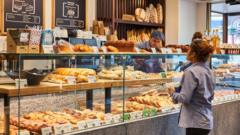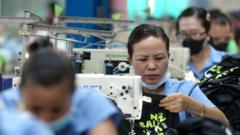Paris Baguette is shifting perceptions of baked goods, launching a global strategy to redefine the croissant while expanding its international presence.
Korean Bakery Paris Baguette Redefines Croissant Culture

Korean Bakery Paris Baguette Redefines Croissant Culture
Paris Baguette embraces global flavors, asserting that croissants can transcend their French roots.
In the vibrant malls of Singapore, the aroma of fresh baked goods draws crowds to various bakeries, particularly the Korean chain Paris Baguette. Despite its name and decor evoking French influence, the chain proudly identifies as 100% Korean. “I wouldn’t limit our bread to everything from France. We are an international brand,” asserts Jin-soo Hur, the president of SPC Group, which owns Paris Baguette.
Founded 80 years ago as a family business, SPC has become a significant player in mass production of bread and pastries in South Korea, employing 20,000 people and generating $5.6 billion in sales last year. Paris Baguette, the first Korean bakery to open an international store in China in 1988, now boasts 4,000 outlets across 14 countries and has ambitious plans to open over 1,000 new locations by 2030, focusing heavily on the U.S. market.
To support its expansion, Paris Baguette is constructing its largest overseas factory in Texas, expected to complete in 2027, supplying goods to the U.S., Canada, and Latin America. Mr. Hur sees penetrating the American market as vital for the brand's success abroad.
Sports partnerships, such as with the English Premier League team Tottenham Hotspur, are also integral to their marketing strategy. With South Korea's Son Heung-min as the team captain, Mr. Hur suggests that food and sports create a vibrant cultural exchange.
While maintaining a strong connection to Korean identity, the company adapts to local tastes. They’ve invested in a halal-certified facility in Malaysia to cater to demand across Southeast Asia and the Middle East. Additionally, the bakery is boosting its offerings with Asian-inspired flavors, reflecting a growing interest in global cuisines.
However, challenges abound, particularly due to economic pressures impacting global markets. The U.S. inflation rate poses hurdles for operations as Paris Baguette seeks to capture American customers. In light of the cost-of-living crisis, many companies are reevaluating their strategies.
Despite these challenges, Mr. Hur emphasizes that the mission extends beyond profits. “If we are only trying to make profit, we'll just stay in Korea. We want to change the bread culture around the world,” he asserts, showcasing a commitment to creating a broader appreciation for diverse baked goods worldwide.





















